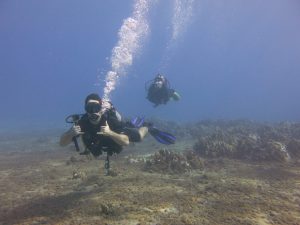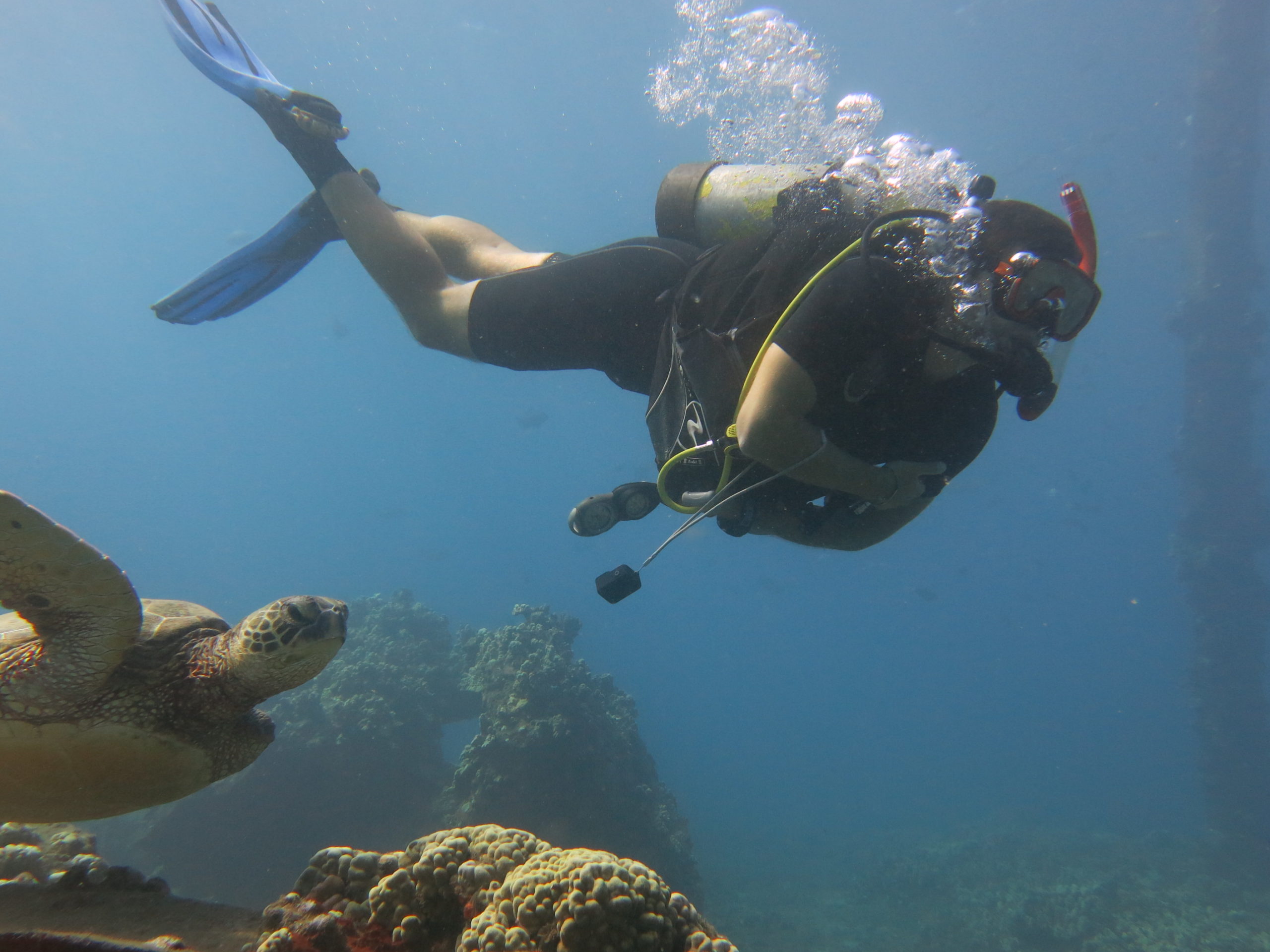5 Scuba Diving Tips to Conserve Air

Beginner scuba divers often ask their instructor how much air they should have left after diving. Since most Maui scuba dives from the shore are shallow (maximum depth 40 feet), I tend to finish my dives with about 1,300 psi, which is almost half of a tank. Whenever I share this information with new divers they often look down at their gauges in disbelief and say, “How do you do that?”
Two people can go to the same depth for an equal amount of time, yet their dive times can differ by a significant interval. So, why is there such a discrepancy in air consumption between scuba divers? Here are 5 SCUBA diving tips to help you conserve air and extend your bottom time.
Top 5 Ways Divers Save Air
1. Slow Down

Scuba dive in Maui with improved air consumption from these helpful tips!
SCUBA divers in Maui, and worldwide, are often unaware of how much their breathing increases due to the onset of nervousness and stress. Before you go diving, it is beneficial to visualize your dive plan. Take a few moments to close your eyes and walk through your safety checks and water entry in your head. Imagine yourself completing each step without rushing. Setting up a mental checklist will automatically give you more confidence when you complete these essential steps.
Now visualize yourself breathing out of your regulator and beginning to descend. As you exhale, imagine deflating your BCD and slowly sinking beneath the surface. The faster you breathe when you start your dive, the harder it becomes to descend. These first few seconds of the dive often cause nervous divers more stress because their breathing intensifies as they realize they are not going down. Relax, exhale, slowly sink, and equalize.
On your first scuba dive, you learn that slow, deep, continuous breaths are essential to a successful experience. This notion stays with us throughout our diving lives. It’s not magic! Experienced divers breathe slowly and continuously underwater, and have excellent air consumption.
2. Dive More Often
SCUBA divers, without fail, can dive longer and better conserve their air when they dive often. You might live in a land-locked place that doesn’t allow you to get underwater. But if you have a local dive center with a pool, do yourself a big favor and practice blowing bubbles. The more comfortable you are with breathing and swimming underwater, the more comfortable you will be. Diving often also allows you to practice your buoyancy control and practice swimming more efficiently. If it has been six months since you last went diving, do a SCUBA review dive. Practicing basic skills and buoyancy control only builds confidence in your diving and improves your efficiency underwater.
3. Practice Proper Buoyancy Control
One fundamental aspect of diving that you learn in your PADI Open Water course is maintaining controlled buoyancy underwater through efficient movements. What does this mean? When weightless underwater, you control your depth with breathing and kicking techniques. If you carry the proper weight, you should slightly rise by inhaling and sink as you exhale. By mastering buoyancy control, you keep yourself and the coral reef safe!
Efficient movement underwater means streamlining your body so that you don’t create drag by increasing the surface area of your body moving through the water. Imagine cruising through the water like a torpedo instead of swimming upright. Efficient body positioning and breathing go a long way toward improving your bottom time.

Scuba diver properly weighted and streamlined at Mala Wharf in Lahaina, Maui.
4. “You Don’t Need So Much Weight!”
I say the above phrase to my guests all the time! But everyone can learn to determine the amount of lead weight they should carry SCUBA diving. For example, a 5’11” 180-pound person would wear 12 pounds depending on personal comfort and wetsuit thickness. If you dive in tropical water with a thin 3mm wetsuit, you can make this calculation by taking 10 percent of your body weight and subtracting 4 to 6 pounds. If you dive in cold water with a thicker 7mm wetsuit, you can add 4 to 6 pounds instead.
Divers often think that they need much more weight than they do. However, diving with too much weight makes it harder to control your buoyancy and pulls down the bottom part of your body as you compensate by kicking up to fight the fact that you are sinking. The more work you do to control your buoyancy, the faster you will breathe through your tank.
Conversely, diving with too little weight can cause you to struggle to stay down while making you breathe through your tank much faster and not allow you to conserve your air. Diving properly weighted is not a game to see how little you can take. Take enough weight to keep your movements comfortable and controlled underwater.
5. Fix Leaks
When referring to the O-ring of your scuba tank, there is a saying in diving that goes, “Little bubbles, no troubles.” While a tiny stream of bubbles emitting from your tank is nothing to panic about, this leak will only worsen and could lead to trouble in the future if the O-ring is not changed. If you can hear air leaking from your tank’s O-ring connection upon setting up your equipment, then you should change the O-ring before diving. Not only does this leak waste your air, but you also would not want the O-ring to fail underwater.
A leaky scuba mask is not only annoying, but it also causes a severe increase in your air consumption. When you constantly blow air out of your nose to clear a leaky mask, it can cause new stresses, leading to more rapid breathing and ultimately not allowing you to breathe efficiently. Make sure to wear a diving mask that fits properly. You can read this blog about how to find a scuba mask for the shape of your face.
And finally, mind your regulator! Scuba divers regularly enter the ocean incorrectly by allowing their mouthpieces to face up. But what happens when you point your mouthpiece in the wrong direction and submerge it? Your regulator free flows! Frequently, divers lose at least 5 minutes of dive time because of a free-flowing primary or alternate regulator and fumbling around trying to stop it.
Final Thought
All of these tips and tricks took me ages to get right. SCUBA diving efficiently to conserve your air takes practice, so give yourself some space to get comfortable underwater and think before you act. I guarantee that if you keep in mind these five tips for conserving your air you will be amazed at your improved bottom time!
